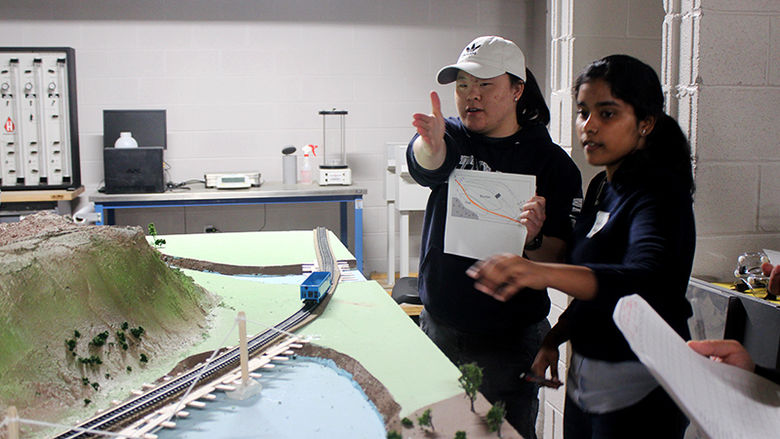The Electrical Engineering Technology (2 EET) major helps prepare graduates for technical positions in the expanding fields of electronics, computers and microprocessors, instrumentation, and electrical equipment. The primary objective is to provide a broad foundation of theoretical and practical knowledge in the areas of electrical and electronic circuits, digital circuits, computers, electrical machinery, and programmable logic controls.
Program Educational Objectives
The Associate Electrical Engineering Technology program is designed to provide a curriculum that prepares students to pursue a career in the industry and to develop in their profession. Due to their experience in the Associate Electrical Engineering Technology program, within few years of graduation, we expect our graduates to have the ability to:
- Apply analytical and empirical skills in the operation, testing, or maintenance of electrical systems.
- Collaborate effectively in project team activities through recognizing the global, societal, and ethical contexts of their work.
- Communicate effectively through preparation and delivery of technical and non-technical documentation and communications.
Student Outcomes
Student outcomes describe what students are expected to know and be able to do by the time of graduation. The Associate Electrical Engineering Technology program is designed to enable students to:
- Apply knowledge, techniques, skills, and modern tools of mathematics, science, engineering, and technology to solve well-defined engineering problems appropriate to the discipline.
- Design solutions for well-defined technical problems and assist with engineering design of systems, components, or processes appropriate to the discipline.
- Apply written, oral, and graphical communication in both technical and non-technical environments; and an ability to identify and use appropriate technical literature.
- Conduct standard tests, measurements, and experiments and to analyze and interpret the results.
- Function effectively as a member of a technical team.
In addition, 2EET graduates must demonstrate knowledge and hands-on competence appropriate to the objectives of the program in:
A. the application of circuit analysis and design, computer programming, associated software, analog and digital electronics, and microcomputers, and engineering standards to the building, testing, operation, and maintenance of electrical/electronic(s) systems; and
B. the application of natural sciences and mathematics at or above the level of algebra and trigonometry to the building, testing, operation, and maintenance of electrical/electronic systems.
Graduates of the Electrical Engineering Technology major may qualify for admission to the baccalaureate degree majors in Electrical Engineering Technology offered at Penn State Harrisburg, Capital College; the baccalaureate degree major in Electrical and Computer Engineering Technology at Penn State Erie, The Behrend College; or the baccalaureate degree major in Electro-Mechanical Engineering Technology offered at Penn State Altoona, Penn State Berks, Penn State New Kensington or Penn State York. Two baccalaureate tracks are available to streamline the transition to these degree programs. Students interested in pursuing the baccalaureate degree major of Electrical Engineering Technology at Penn State Harrisburg should follow track c. A general track is also provided for students who decide not to continue their engineering technology education at the baccalaureate level.
ENTRANCE REQUIREMENTS: Students must have a minimum 2.0 GPA to change to this Associate degree after admission to the University.
For the Associate in Engineering Technology degree in Electrical Engineering Technology, a minimum of 66 credits is required. This program is accredited by the Engineering Technology Accreditation Commission of ABET, www.abet.org.
Many US states and territories require professional licensure/certification to be employed. If you plan to pursue employment in a licensed profession after completing this program, please visit the Professional Licensure/Certification Disclosures by State interactive map.
Program Coordinator
Patrick Hein
Lecturer in Engineering[email protected]
Room 35C, Main Classroom Building
717-718-6787
